
Marilyn Jeanne Seely is an American singer, songwriter, record producer, actress and author. Most notably identified with the country music genre, Seely found success with the Grammy Award-winning song "Don't Touch Me" (1966). Her soul-inspired vocal delivery gave her the nickname of "Miss Country Soul". Seely is also known for her membership and presence on the Grand Ole Opry, having appeared more times on the program than any other performer.

Jan Howard was an American author, as well as a country music singer and songwriter. As a singer, she placed 30 singles on the Billboard country songs chart, was a Grand Ole Opry member and was nominated for several major awards. As a writer, she wrote poems and published an autobiography. She was married to country songwriter Harlan Howard.
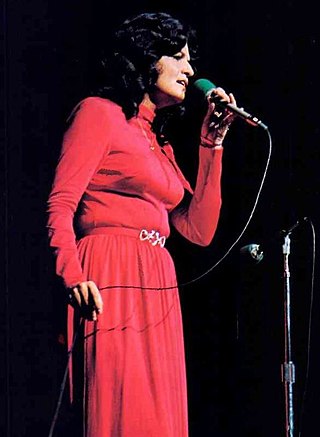
Jeanne Pruett is an American country music singer and songwriter. She also has credits as a published author. Pruett had several major hits as a music artist, but became best-known for 1973's "Satin Sheets". The song topped the country music charts and helped her secure a membership in the Grand Ole Opry cast.

"Evil on Your Mind" is a song written by Harlan Howard that was originally recorded by his wife Jan Howard. Released as a single by Decca Records, the song made the US country top ten in 1966 and became one of six top ten singles in Jan Howard's career. The song received positive reception from publications following its release and was later nominated in 1967 by the Grammy Awards. It also served as the title track to her 1966 studio album Jan Howard Sings Evil on Your Mind.

"Don't Touch Me" is a song written by Hank Cochran. It was originally written for and recorded by American country artist Jeannie Seely. The song was released as a single on Monument Records in March 1966 and became a major Billboard country hit. "Don't Touch Me" became Seely's signature song and her biggest hit as a solo artist. It would later appear on her debut studio album and be re-recorded by Seely in later years.

The discography of American country artist Jan Howard contains 17 studio albums, six compilation albums, 51 singles, one box set, two other charted songs and 12 additional album appearances. Her recordings were issued as singles beginning in 1958. The first to chart was issued by Challenge Records called "The One You Slip Around With". Released in 1959, it rose into the US Hot Country Songs top 20. It was followed by two duets with Wynn Stewart, including the chart record "Wrong Company". Howard's debut studio album, Sweet and Sentimental, featured dual credit with The Jordanaires and was issued by Capitol Records in 1962. In 1963, "I Wish I Was a Single Girl Again" reached the top 30 of the US country songs chart.
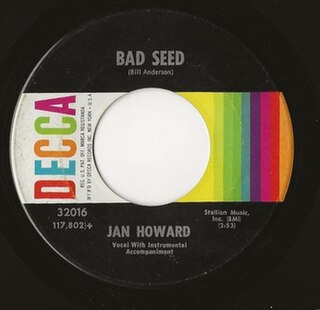
"Bad Seed" is a song written by Bill Anderson that was originally recorded by American country artist Jan Howard. Released as a single by Decca Records, it was the second top ten song on the US country chart in Howard's career. It was given reviews by Billboard, Cash Box and Wide Open Country.

"Count Your Blessings, Woman" is a song written by Bill Anderson that was originally recorded by American country artist Jan Howard. Released as a single in 1968, it placed in the top 20 on the US country chart and the top ten on the Canadian country chart. It was released on an album of the same name and was given reviews from both Billboard and Cash Box magazines.
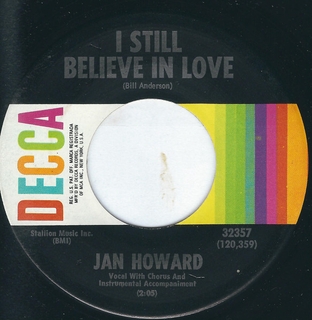
"I Still Believe in Love" is a song written by Bill Anderson that was originally recorded by American country artist Jan Howard. Released as a single by Decca Records, it made the top 40 on the US country chart and the top ten on the Canadian country chart. It was given reviews from both Billboard and Cash Box magazines.

"We Had All the Good Things Going" is a song written by Mervin Shiner and Jerry Monday that was originally recorded by American country artist Jan Howard. Released as a single, it made the top 20 of the US country songs chart in 1969. It later appeared on her 1970 studio album Rock Me Back to Little Rock. The song received reviews from Billboard and Cash Box magazines.
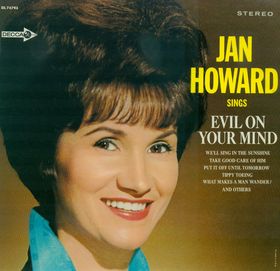
Jan Howard Sings Evil on Your Mind is a studio album by American country artist Jan Howard. It was released in July 1966 by Decca Records and was her second studio album. The project consisted of 12 tracks featuring both uptempo and ballad material. Its title track was a top five US country song in 1966 and was one of four singles on the album. Another was the charting 1964 song "What Makes a Man Wander?". The album itself made the US country survey following its release and received critical reception from Cash Box magazine.

Bad Seed is a studio album by American country music artist Jan Howard. It was released in November 1966 via Decca Records and featured 12 tracks. The third studio album of her recording career, Bad Seed was named for its title track, which reached the top ten of the country charts in 1966. The disc was met with a favorable review from Cashbox following its release.
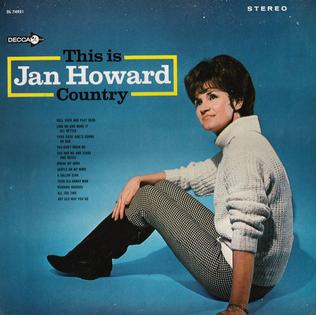
This Is Jan Howard Country is a studio album by American country artist Jan Howard. It was released in November 1967 by Decca Records and contained a total of 12 tracks. The album was the fourth released in Howard's career, featuring both uptempo tunes and ballad songs. Along with cover tracks were also new recordings. This included two single releases that made the US country top 40: "Any Old Way You Do" and "Roll Over and Play Dead". The album itself made the US country albums top ten list. It received positive reviews from both Billboard and Cash Box magazines.

Count Your Blessings, Woman is a studio album by American country music artist Jan Howard. It was released in June 1968 via Decca Records and contained 11 tracks. Many of the album's tracks were cover tunes with the exception of the title track. Released as a single, the title track was a top 20 US country song and a top ten Canadian country song. The album itself made the top 30 of the US country survey. Howard's vocal performance was praised in reviews by Billboard and Cash Box magazines.
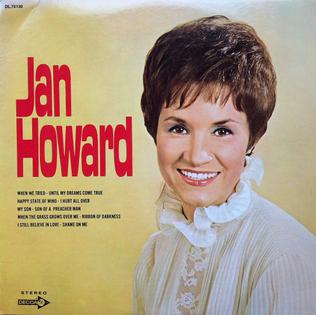
Jan Howard is an eponymous studio album by American country artist Jan Howard. It was released by Decca Records in June 1969 and contained ten tracks. The project contained a series of cover tunes, along with new songs. Among the new recordings were three singles: "I Still Believe in Love", "My Son" and "When We Tried". "My Son" was a letter Howard put to music written to her son who was killed in the Vietnam War. The album was given positive reception by Cash Box and Record World magazines. The album made the US country albums and its three singles reached positions on the North American country songs charts.

For God and Country is a studio album by American country artist Jan Howard. It was released by Decca Records in January 1970 and consisted of 11 tracks. The project was a collection of 11 tracks dedicated to Howard's son who was killed in the Vietnam War. The songs on the album were both patriotic and inspirational music. It was given a positive review by Billboard magazine.

Rock Me Back to Little Rock is a studio album by American country artist Jan Howard. It was released by Decca Records in June 1970 and was her tenth studio album. The project contained 11 tracks with a mixture of original tunes and cover songs. Among its tracks were two single releases: "We Had All the Good Things Going" and the title track. Both made appearances on the US country songs chart between 1969 and 1970. The album itself also made the US country chart. Both Billboard and Cash Box magazines reviewed the album following its release.

Cristy Lane Salutes G.I.'s of Viet Nam is a studio album by American country and Christian artist Cristy Lane. It was released in 1969 via Lane Records and contained a total of 13 tracks. The album was Lane's debut studio album in her recording career and featured songs Lane performed during concert tour entertaining troops during the Vietnam War.
"Any Old Way You Do" is a song written by Harlan Howard that was originally recorded by his wife and American country artist Jan Howard. Released as a single by Decca Records, it rose into the US country top 40 in 1967 and was later issued on her studio album This Is Jan Howard Country. It was given positive reviews by music publications following its release.
"Roll Over and Play Dead" is a song written by E. Rich that was recorded by American country artist Jan Howard. Released as a single by Decca Records, it placed in the top 40 on the US country songs chart in 1967. The song was given positive reviews from music publications following its release and was later included on Howard's studio album This Is Jan Howard Country.


















